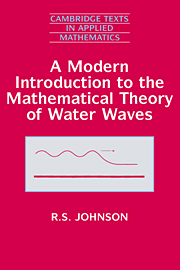2 - Some classical problems in water-wave theory
Published online by Cambridge University Press: 04 May 2010
Summary
Yet let us hence, and find or feel a way
Thro' this blind haze
The Passing of ArthurThe study of problems in water-wave theory, particularly under the umbrella of the linear approximation, goes back over 150 years. In the intervening time, many different problems – and extensions of standard problems – have been discussed by many authors. In a text such as ours, it is necessary to make a selection from this body of classical work; we cannot hope to describe all the various problems, nor all the subtle variants of standard problems. Our intention is, of course, to include the simplest and most fundamental results (such as, for example, the speed of waves over constant depth and the description of particle paths), but otherwise we choose those topics which contain some interesting and relevant mathematics. However, since we shall not present all that some readers might, perhaps, expect or prefer, we endeavour to remedy this by introducing additional examples through the exercises. The sufficiently dedicated reader is therefore directed to the exercises, particularly if a broader spectrum of water-wave theory is desired.
The material here is presented under two separate headings. The first is linear problems, where, apart from the elementary aspects mentioned above, we single out those topics that are attractive and which will prove relevant to some of our later discussions. Thus we describe waves on sloping beaches, as well as the phenomenon of edge waves.
- Type
- Chapter
- Information
- Publisher: Cambridge University PressPrint publication year: 1997



